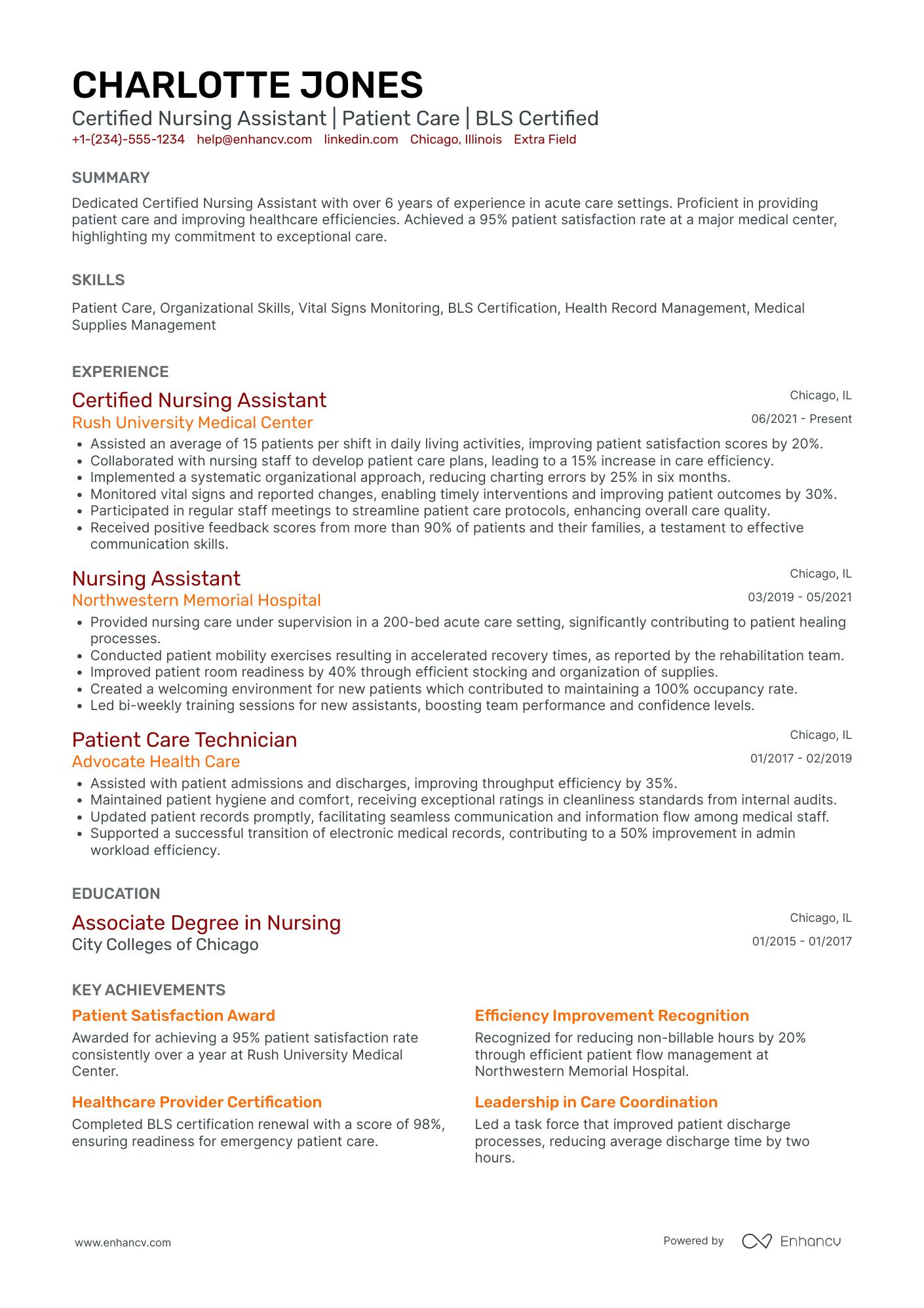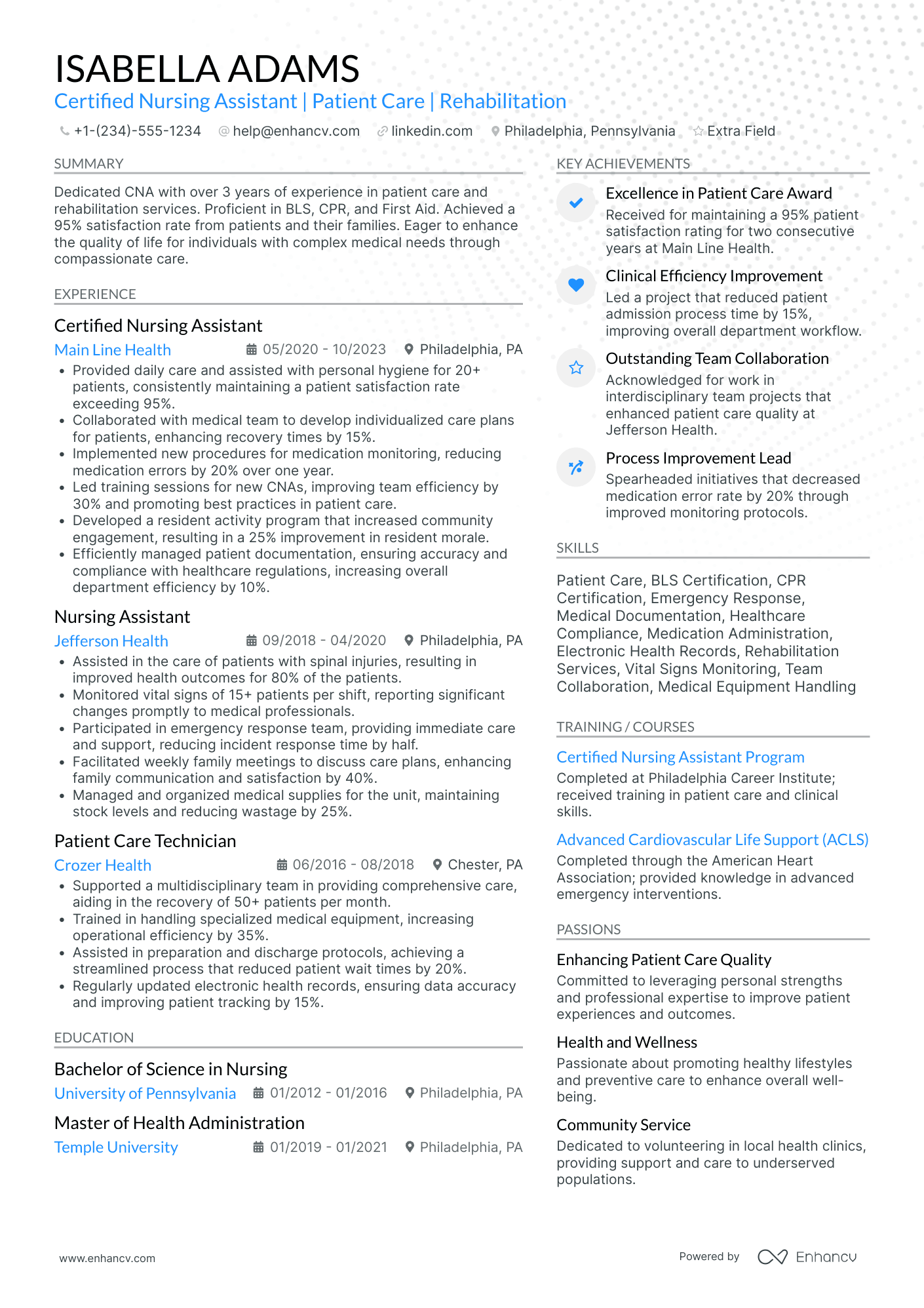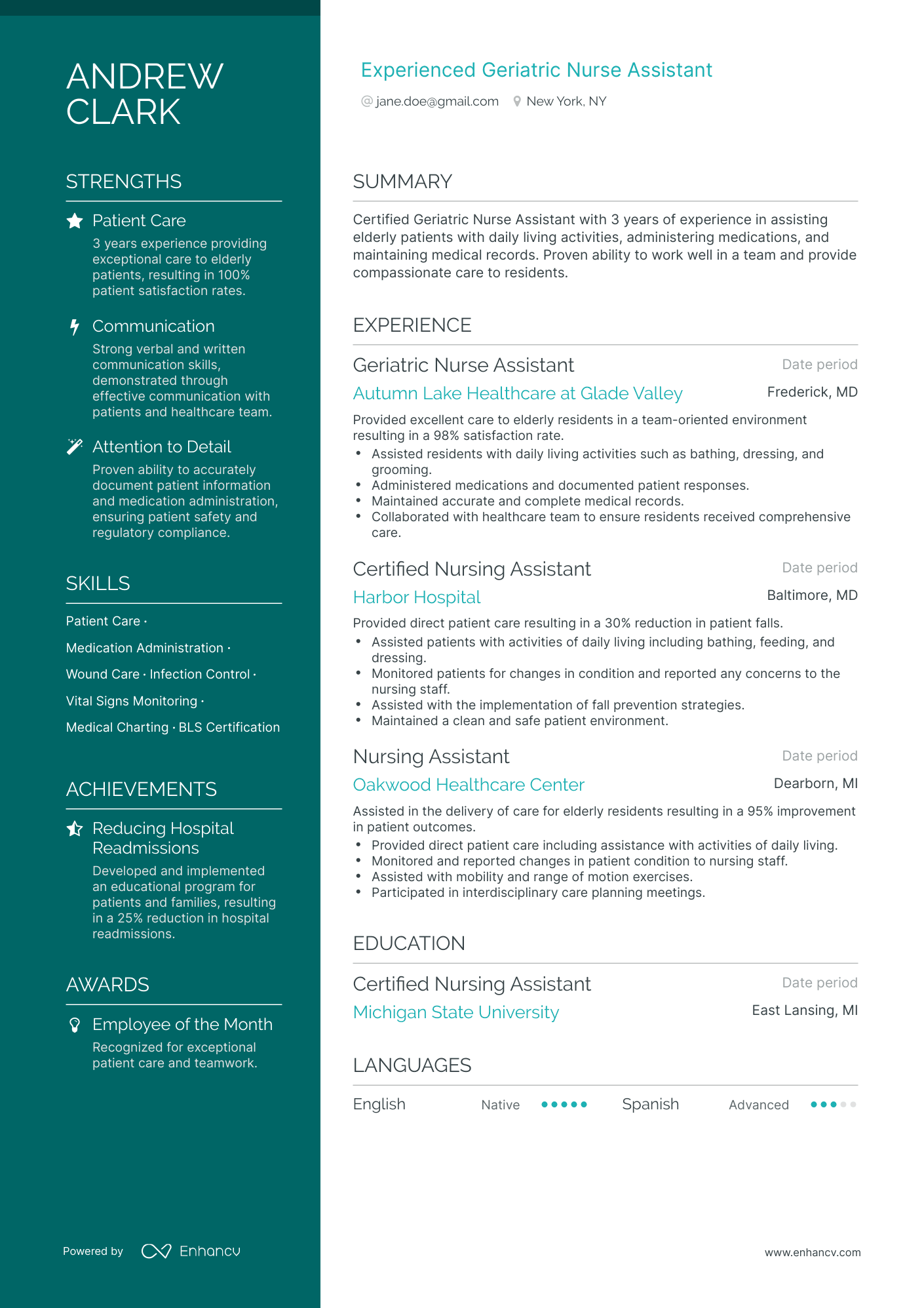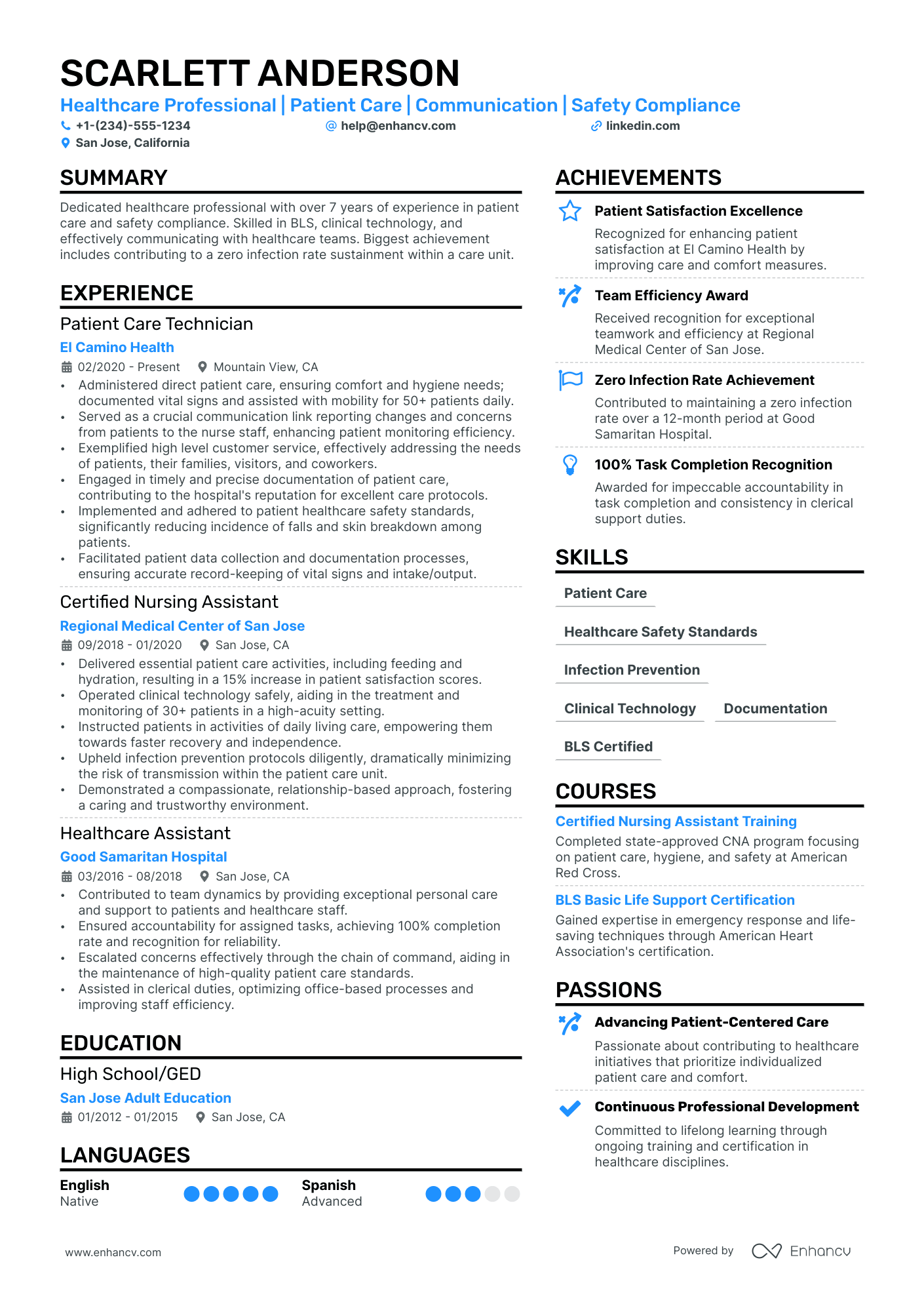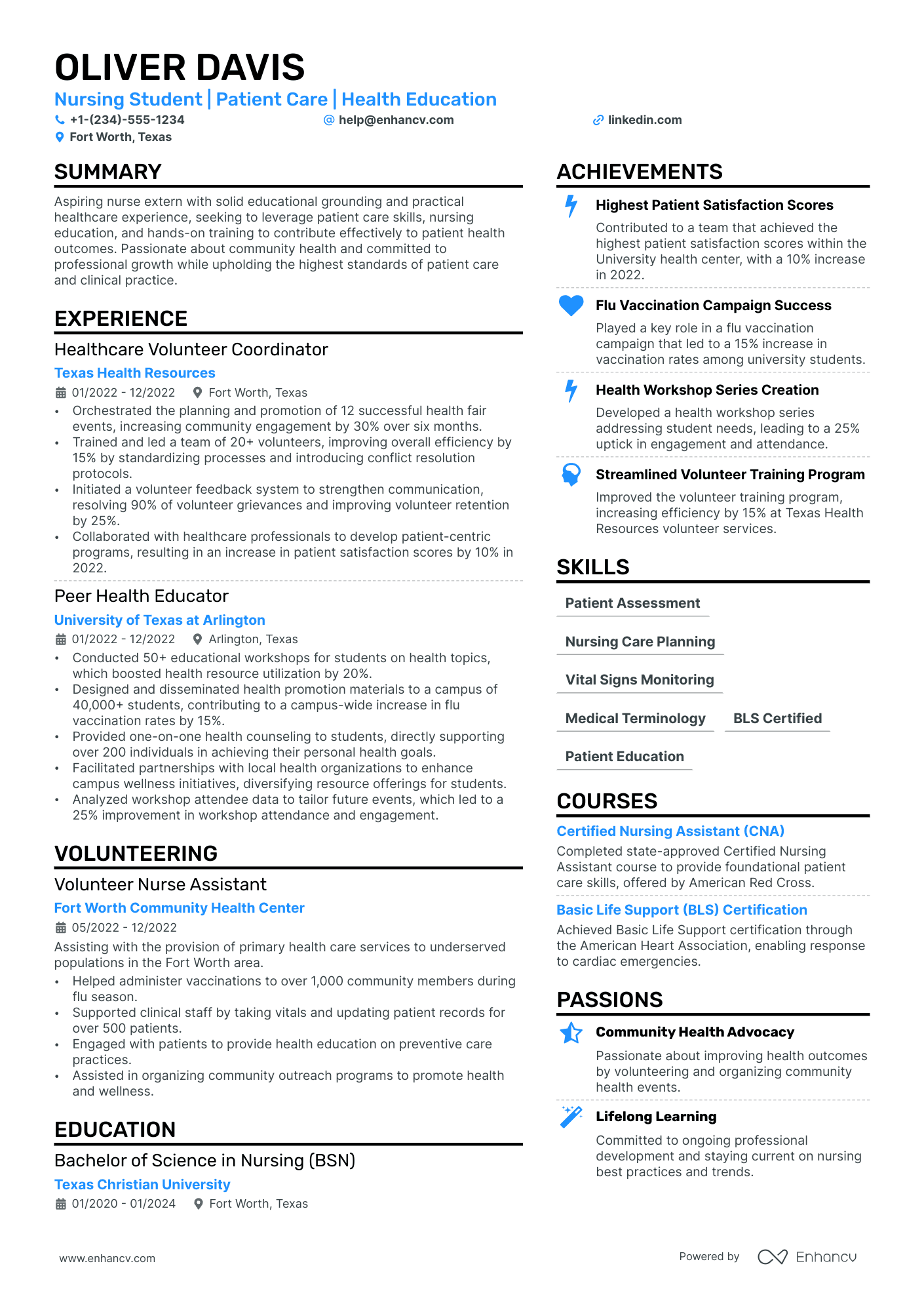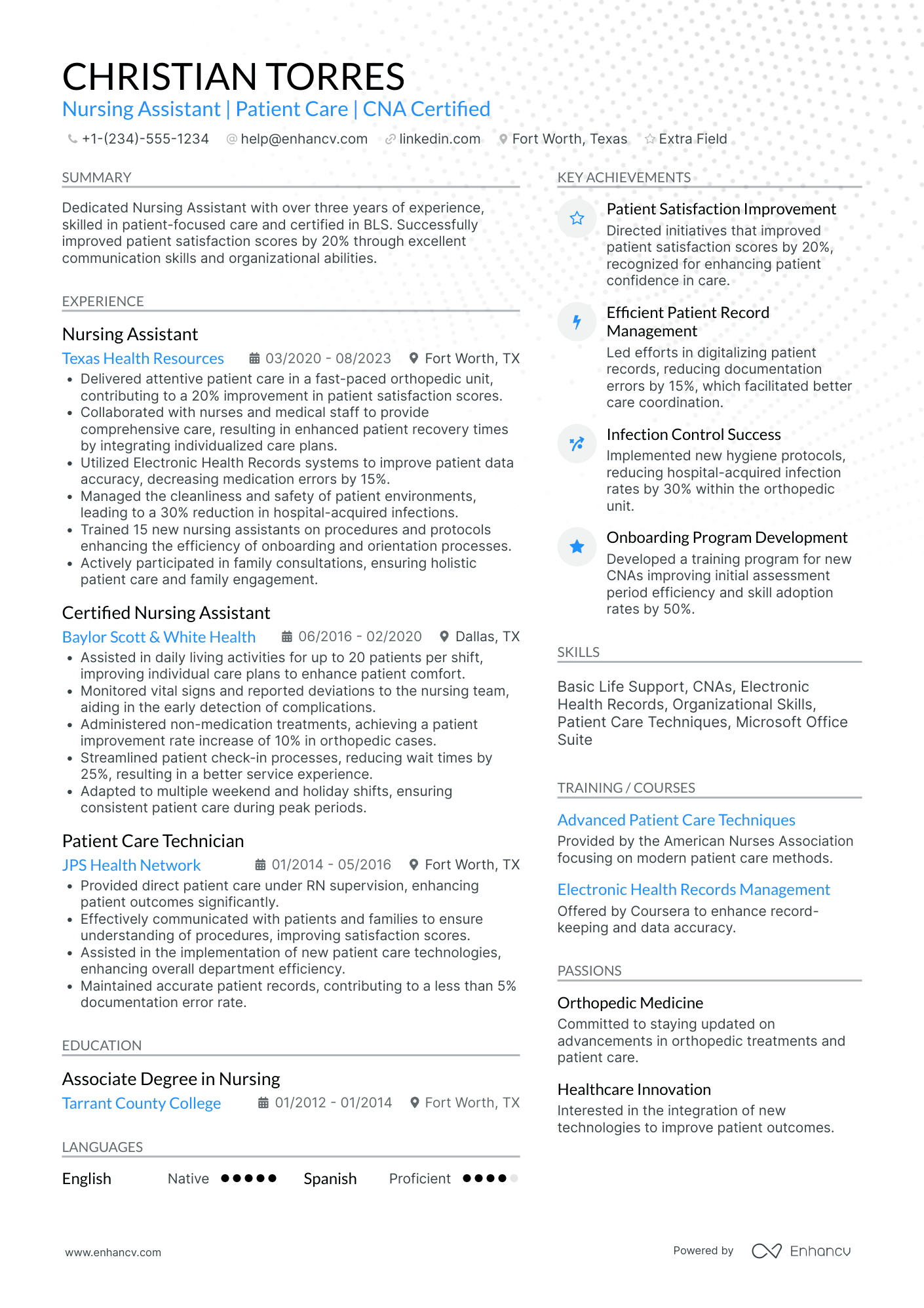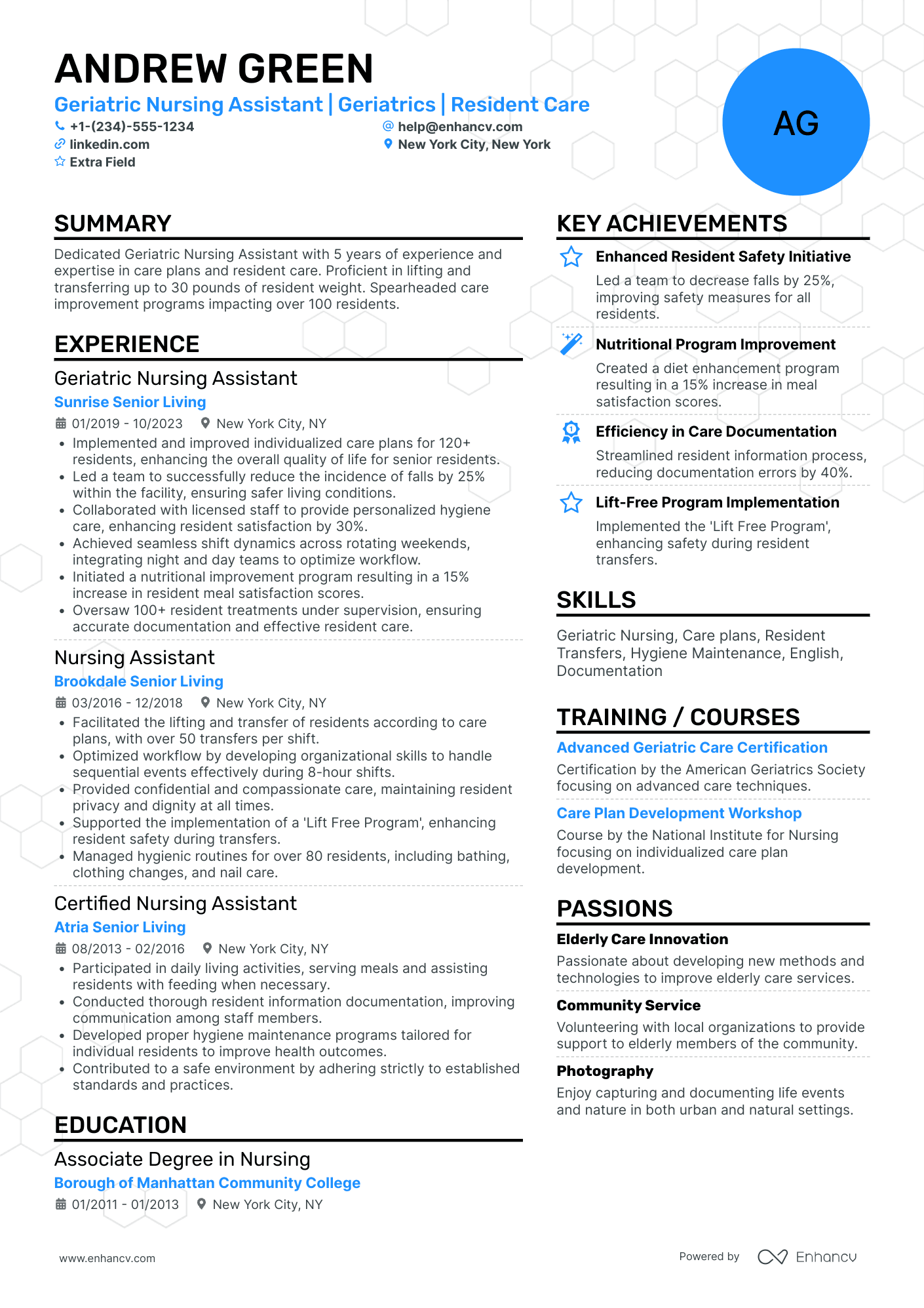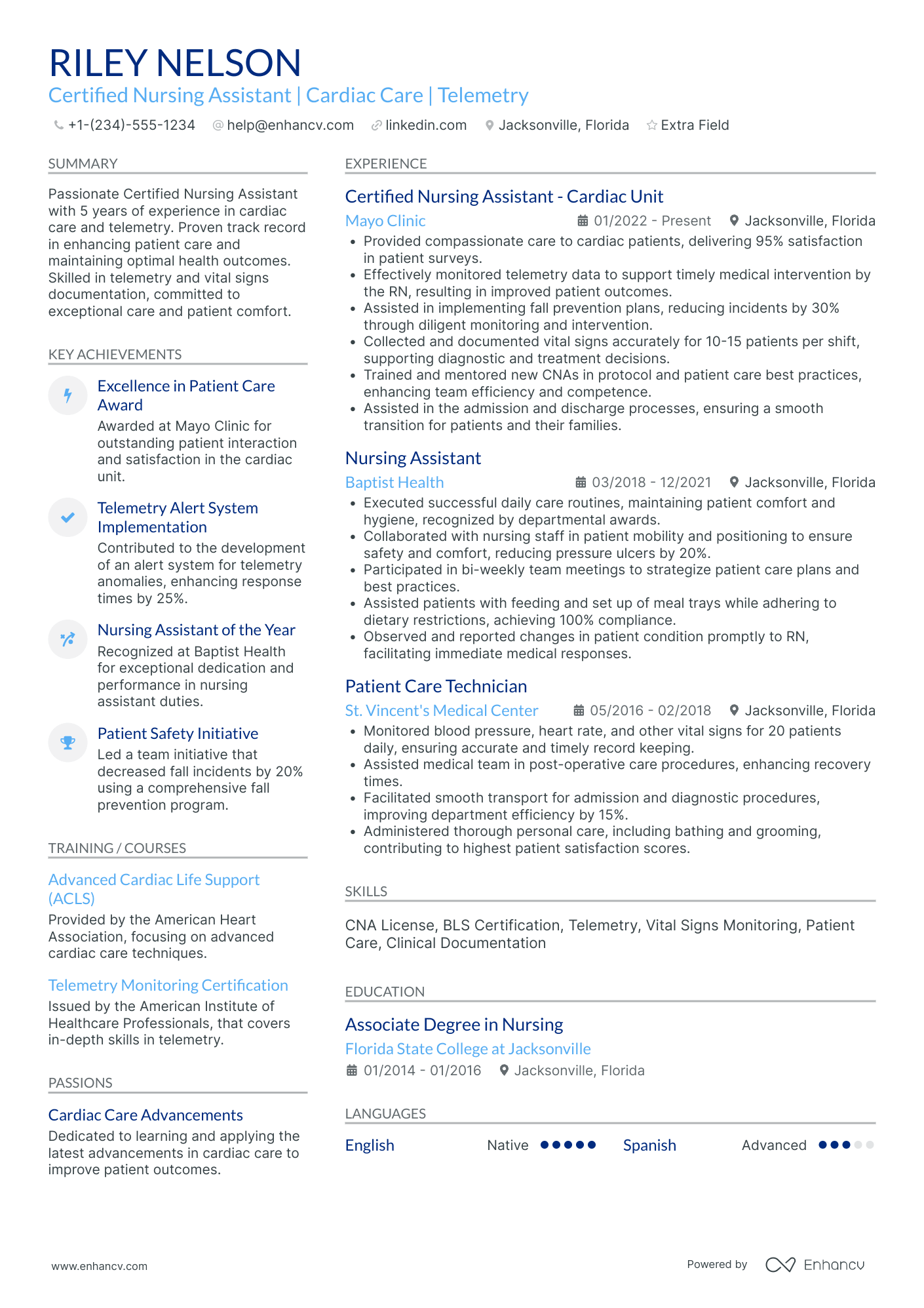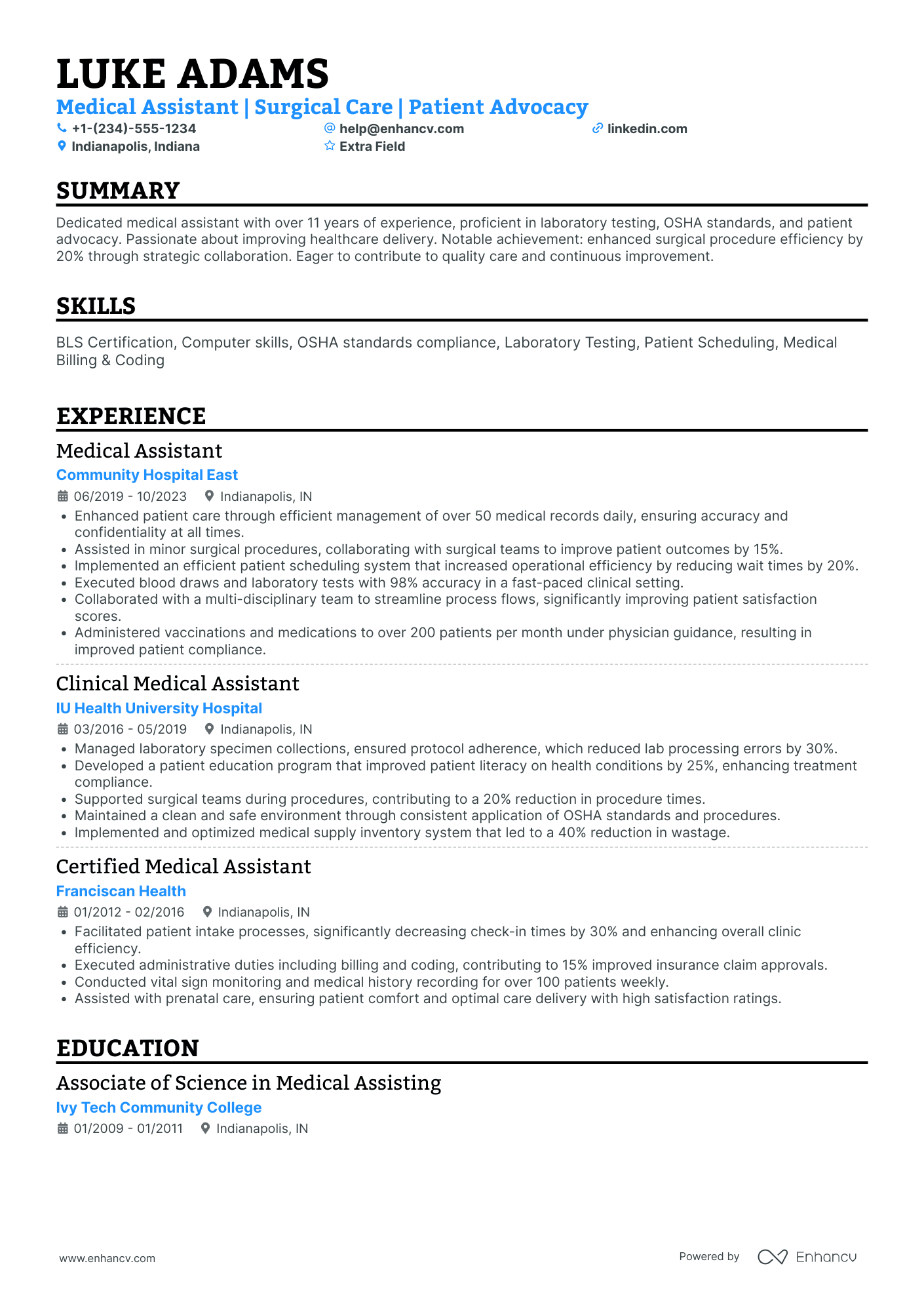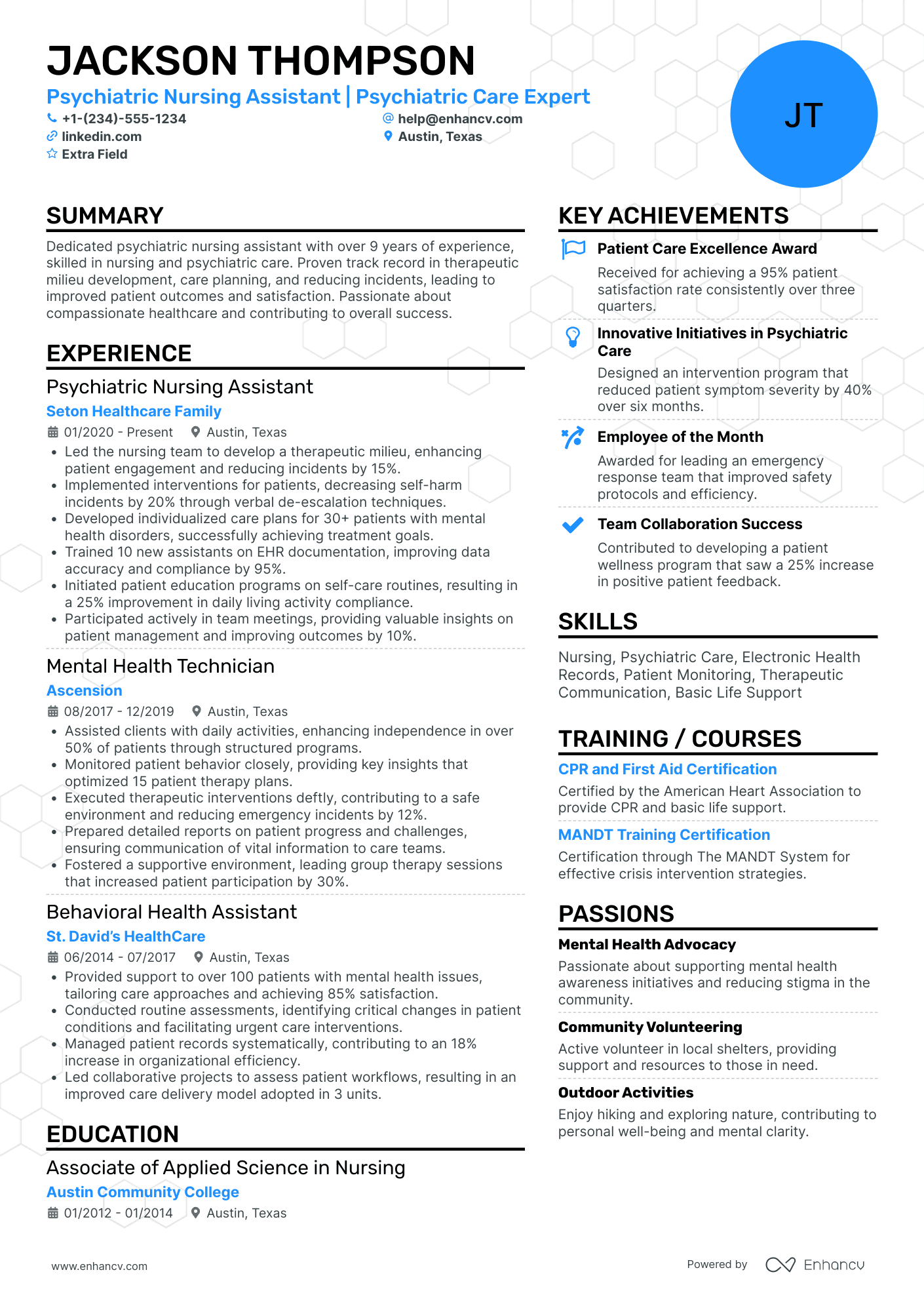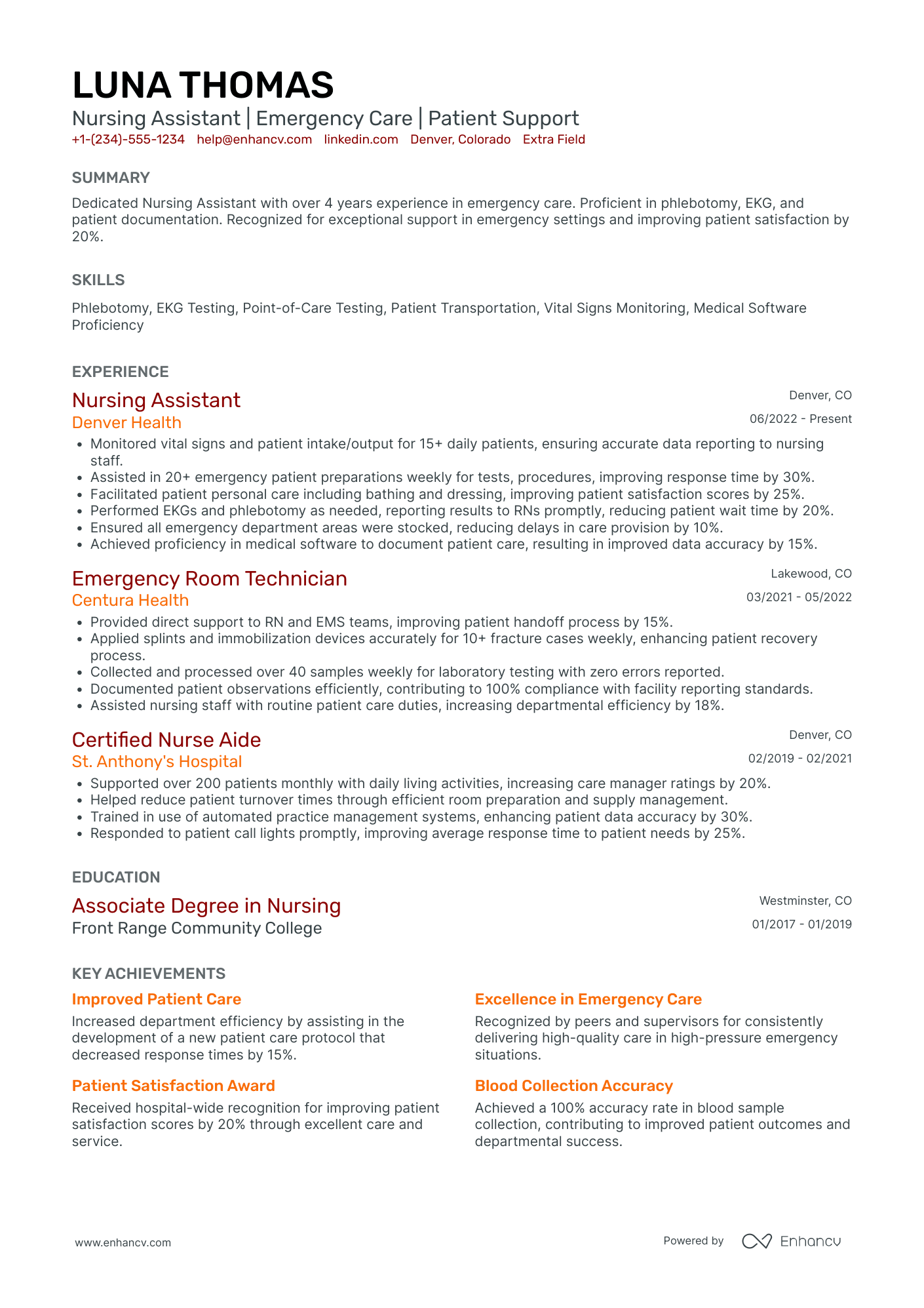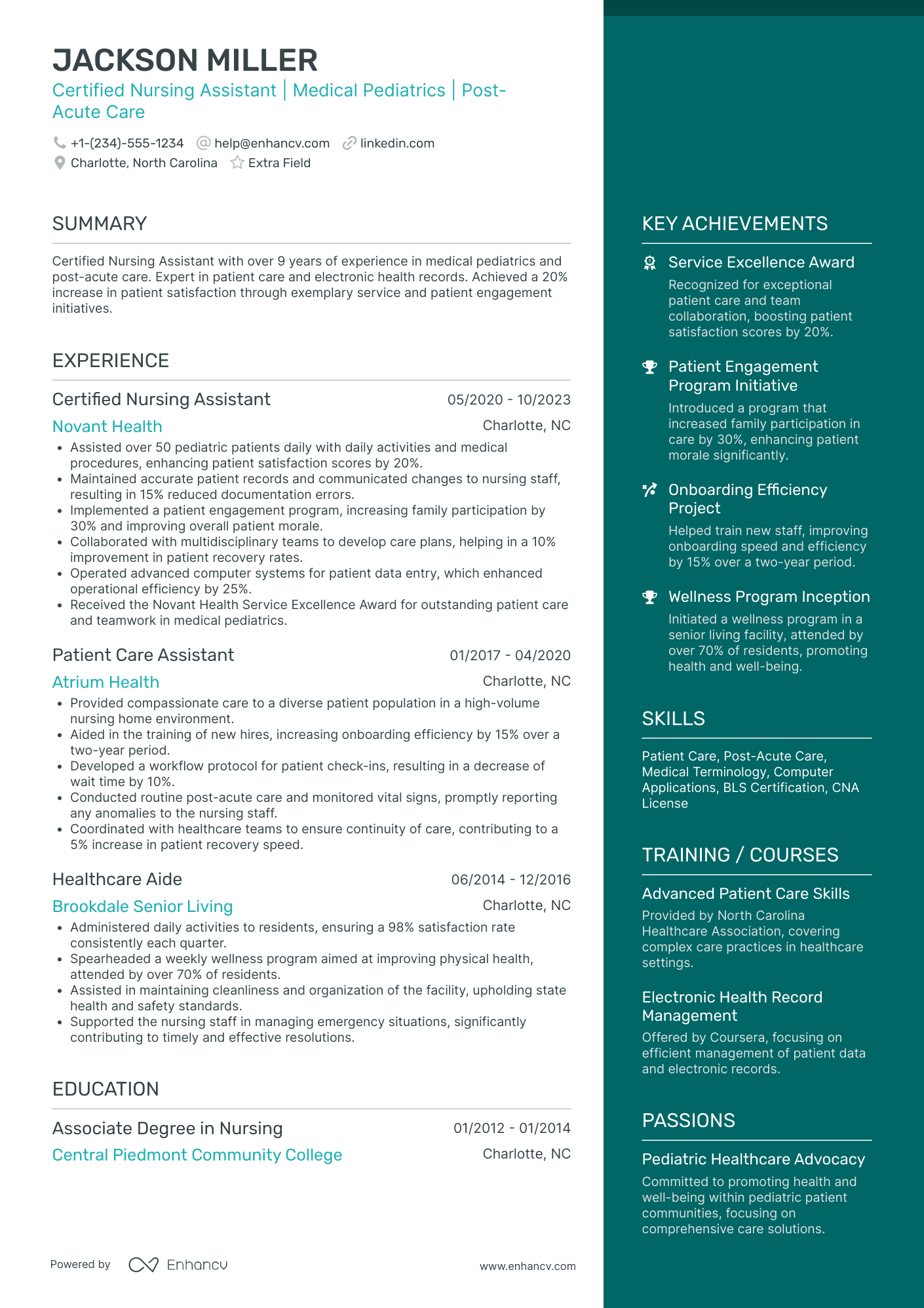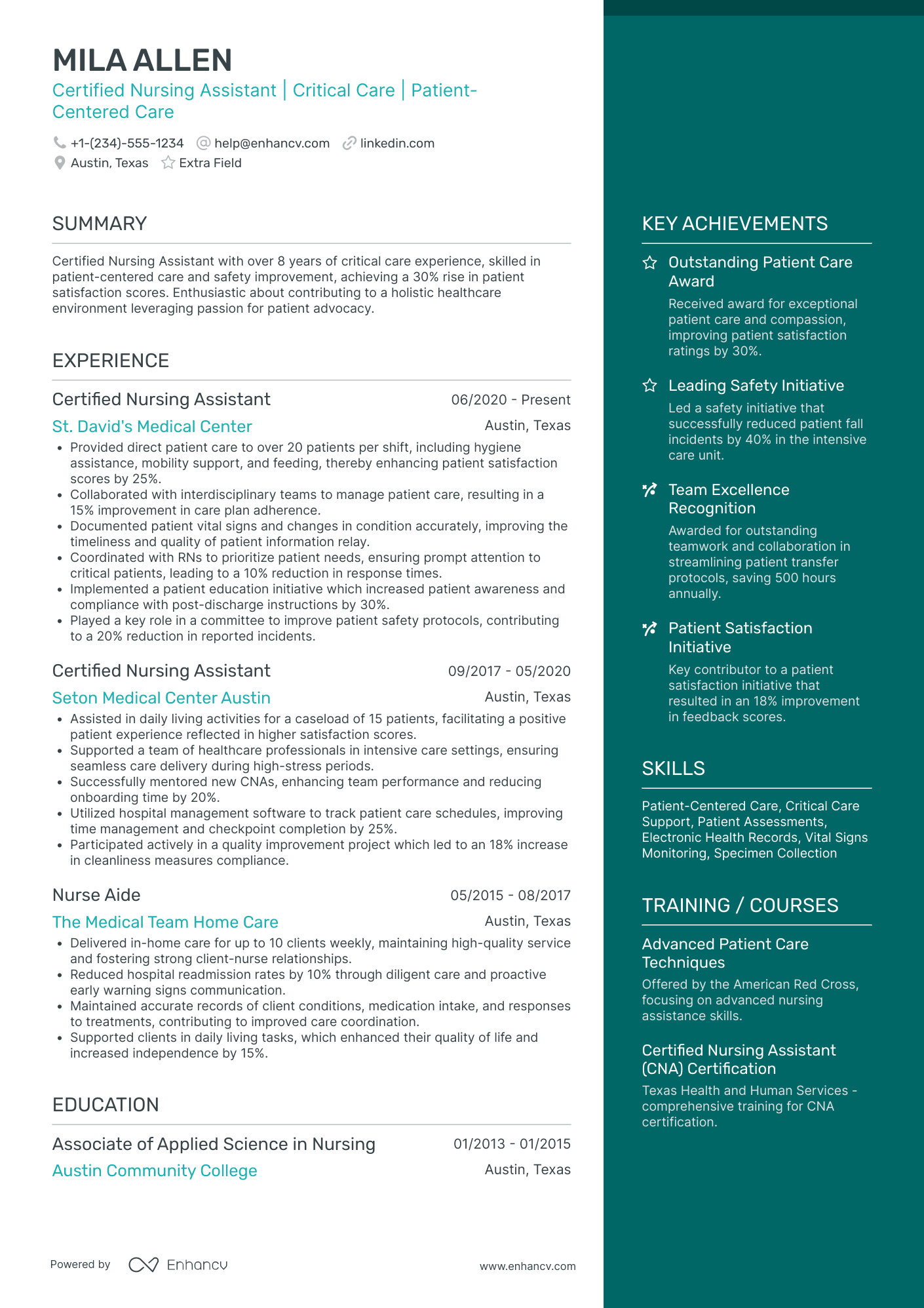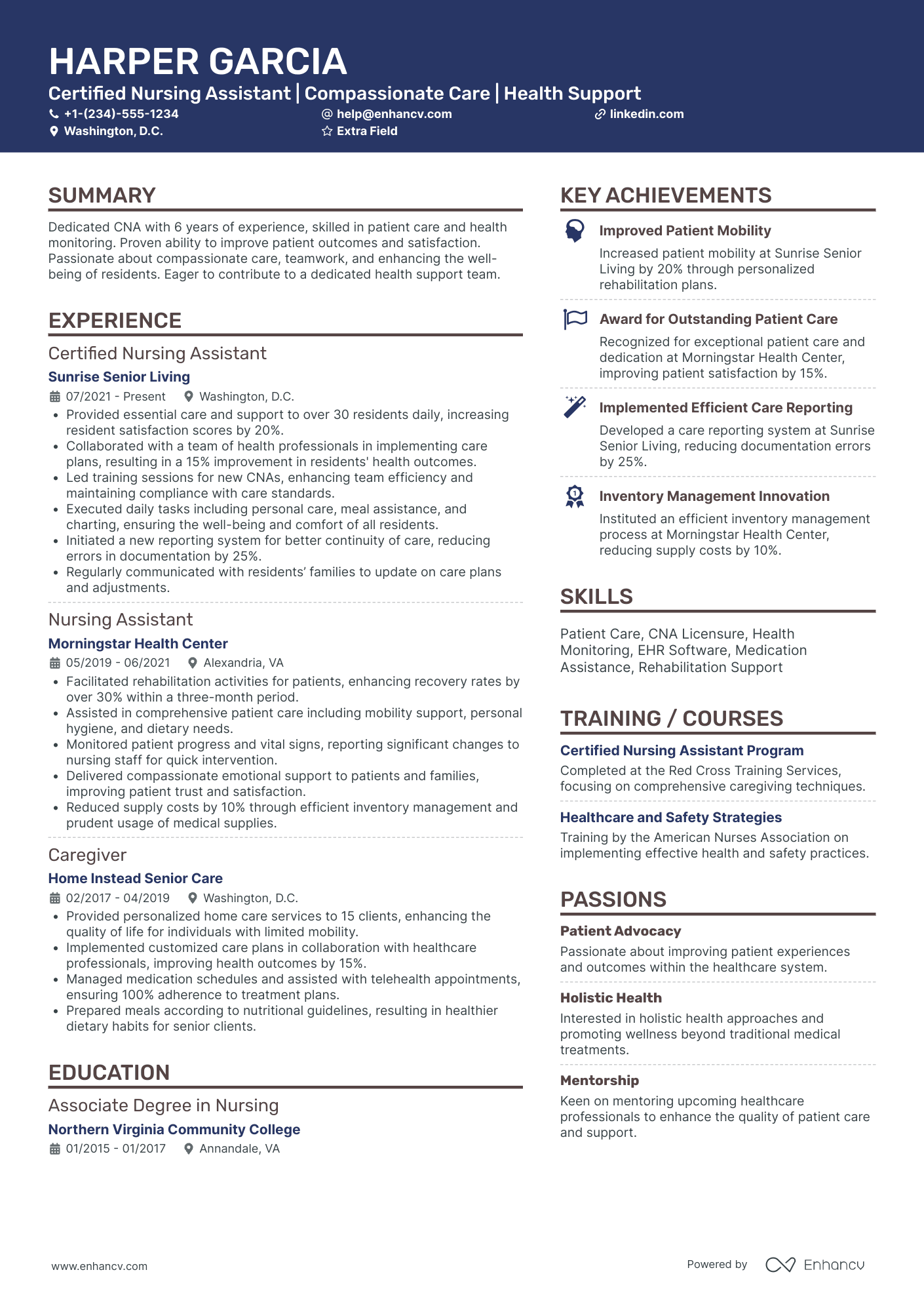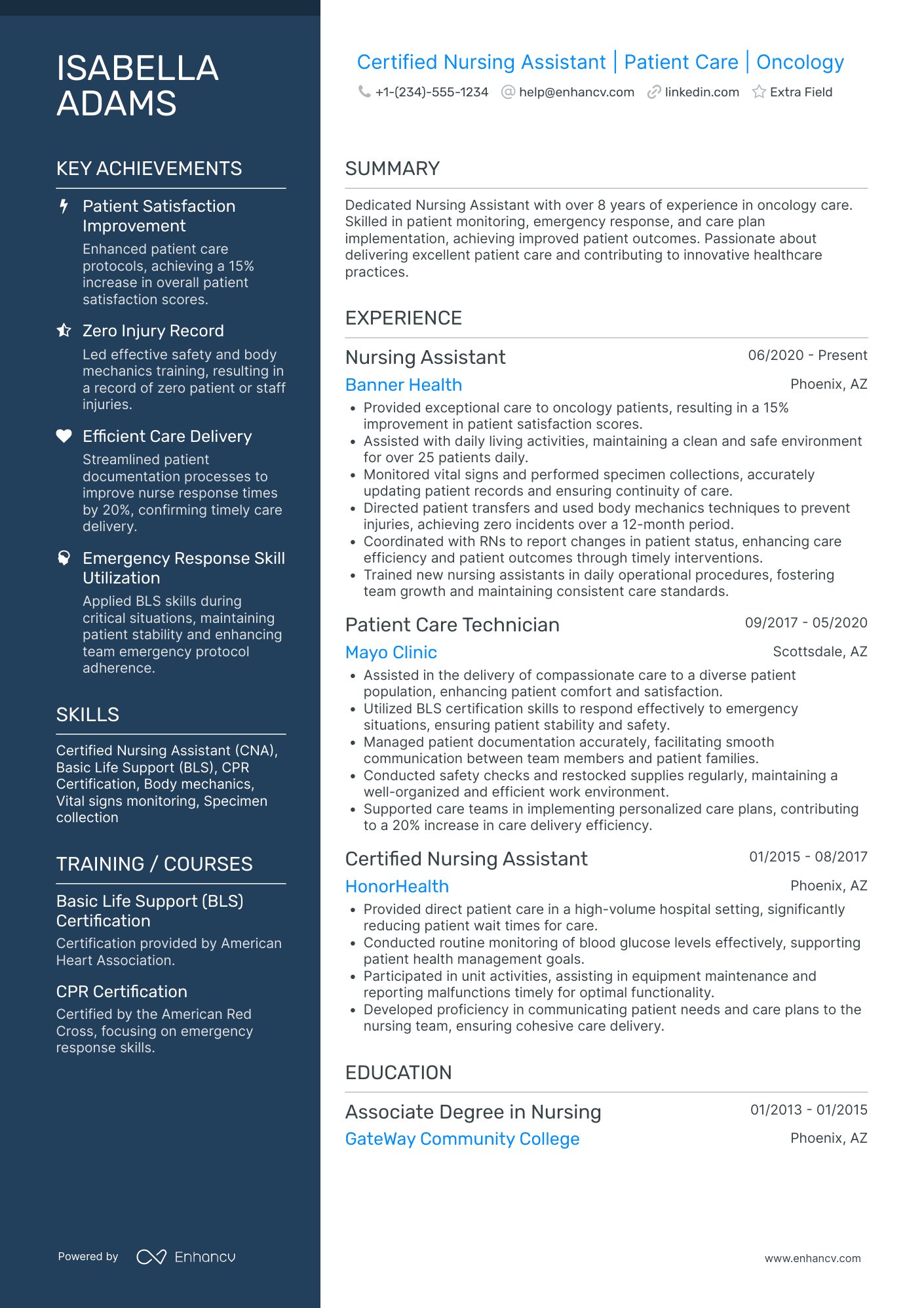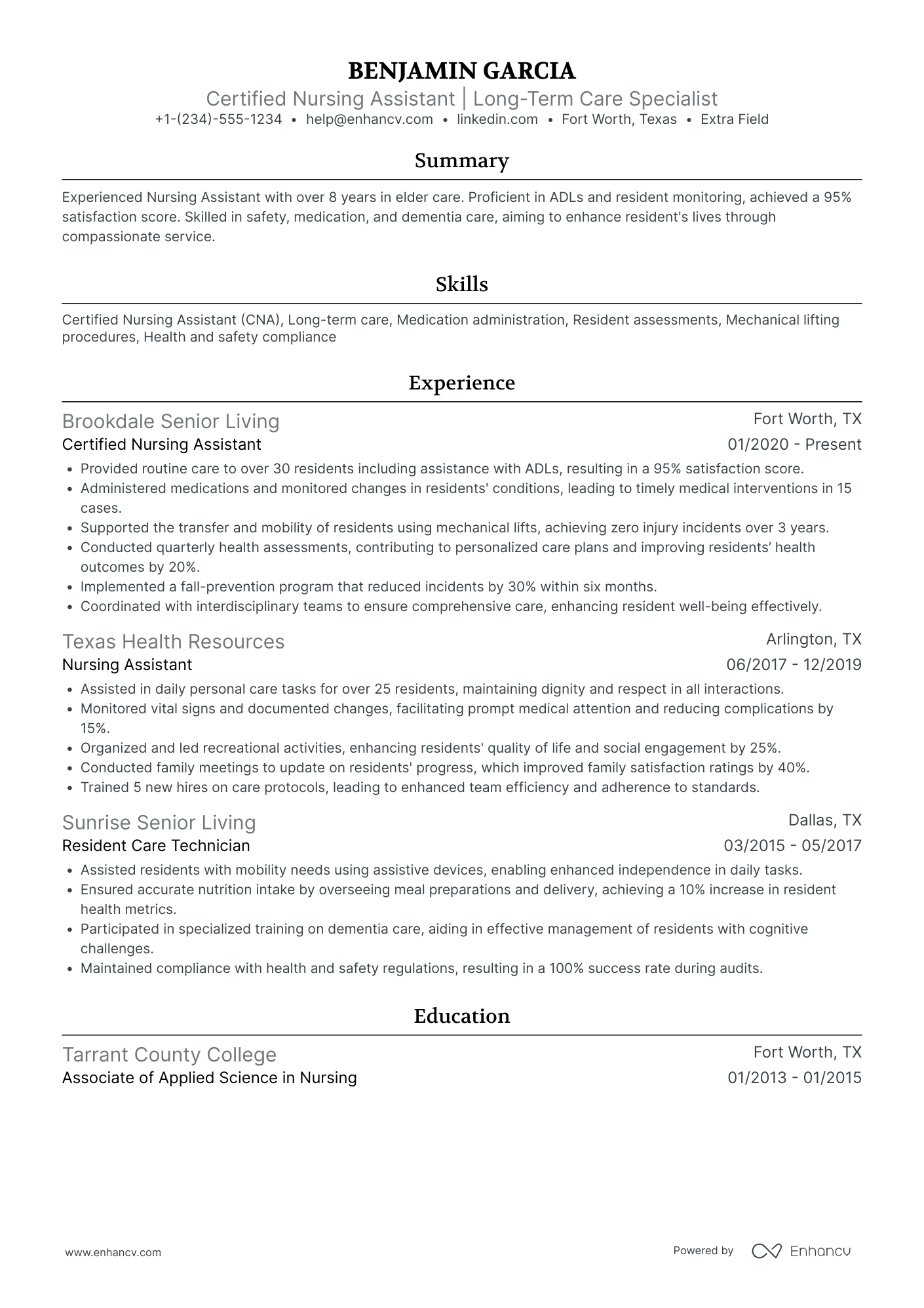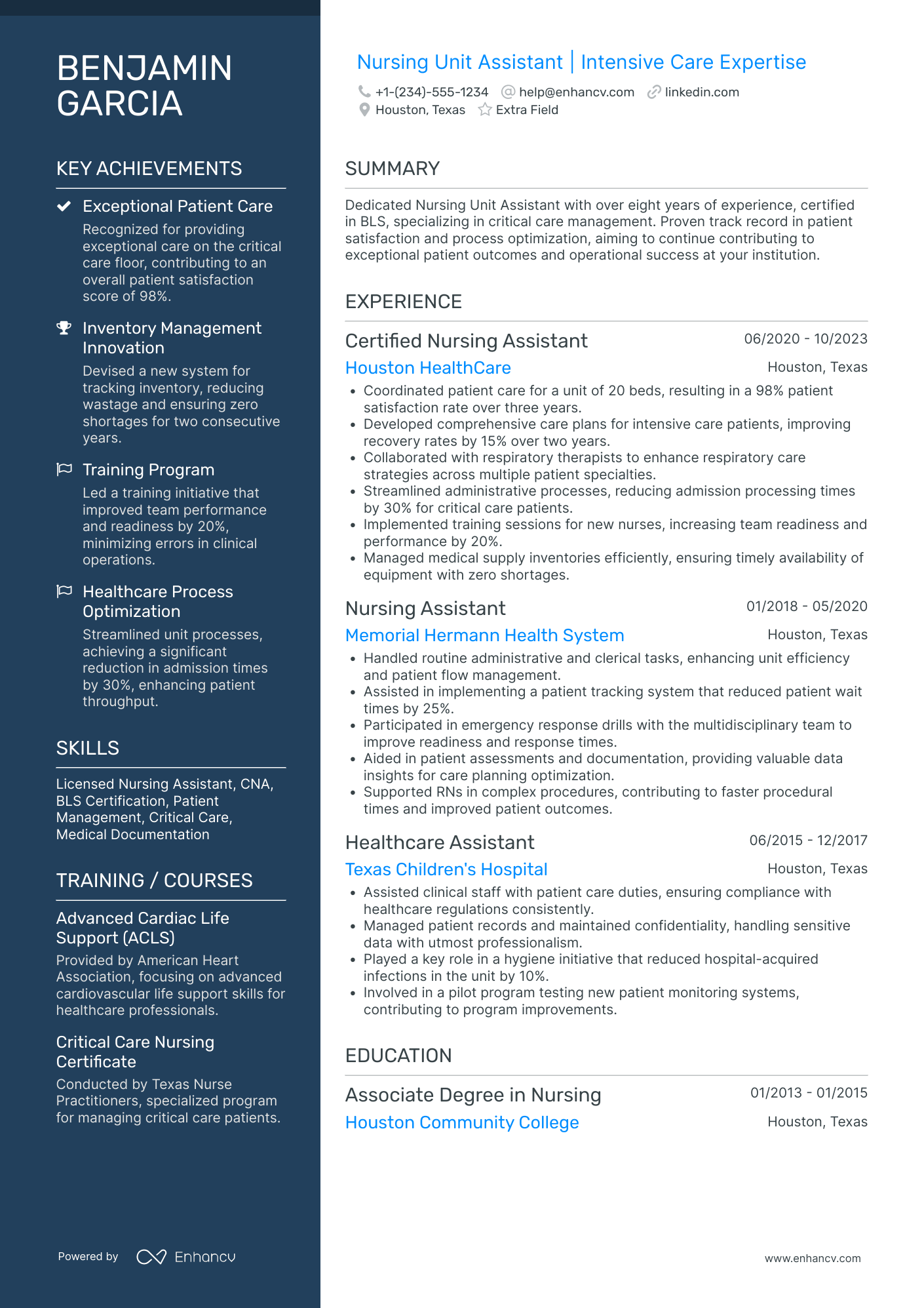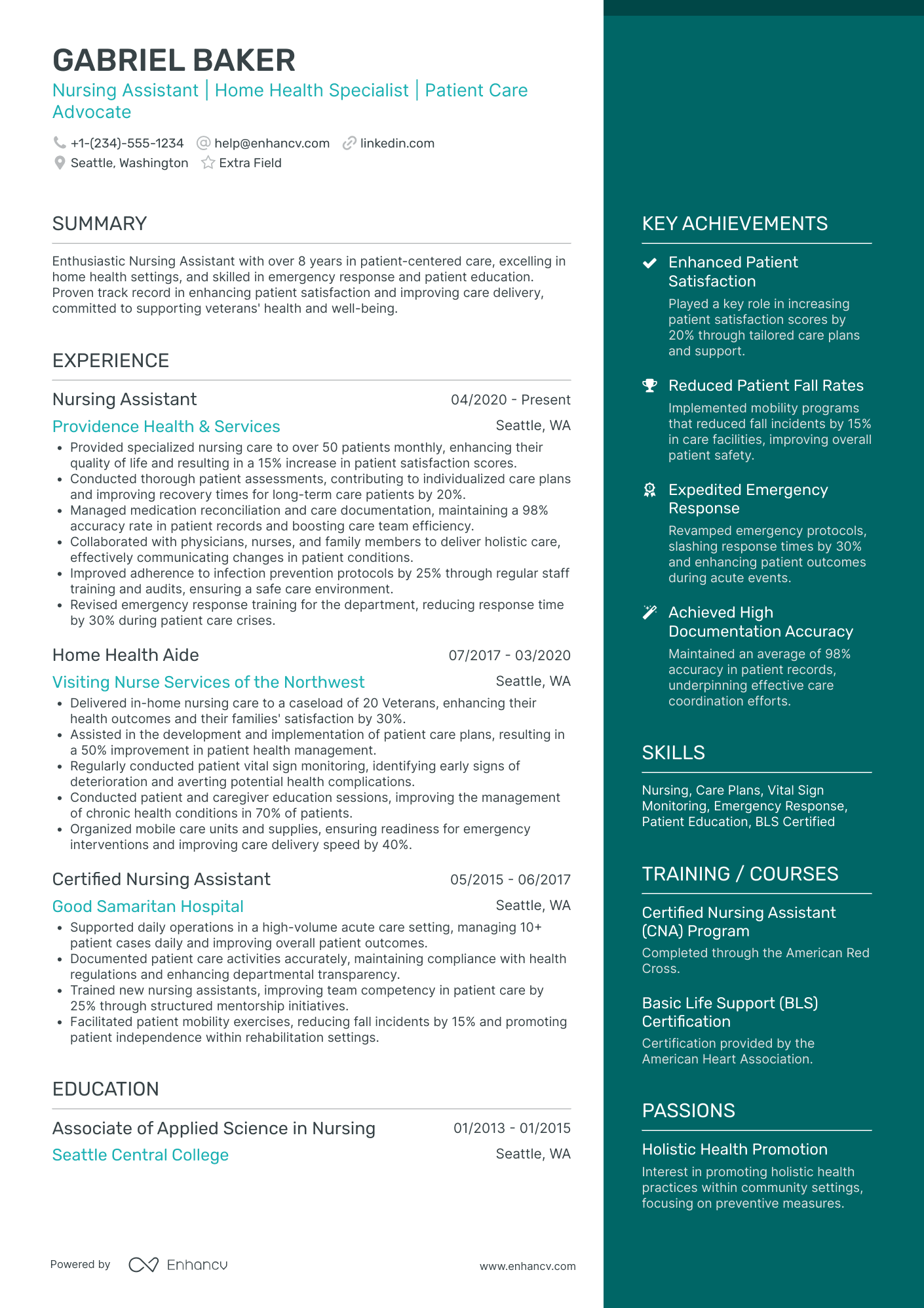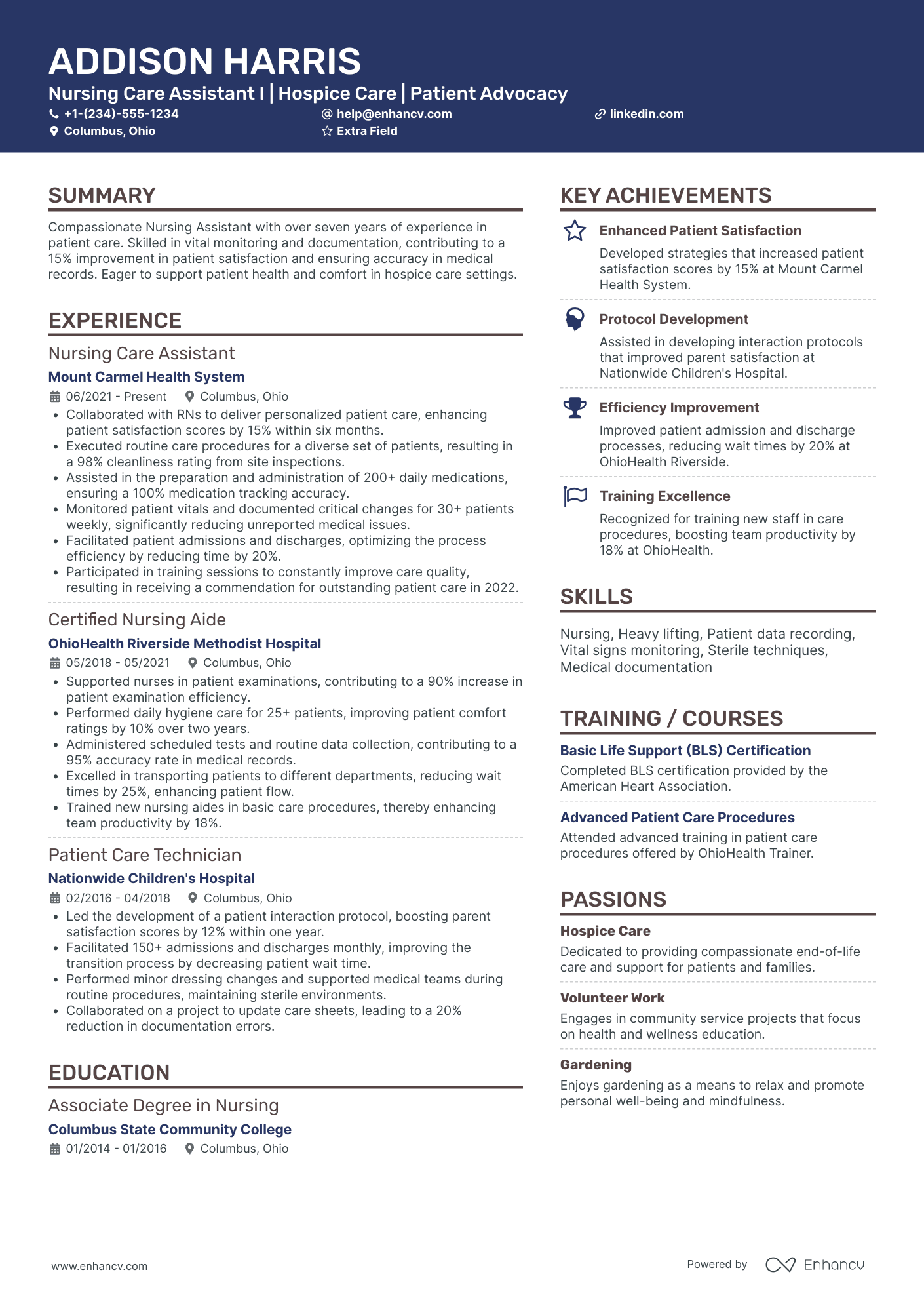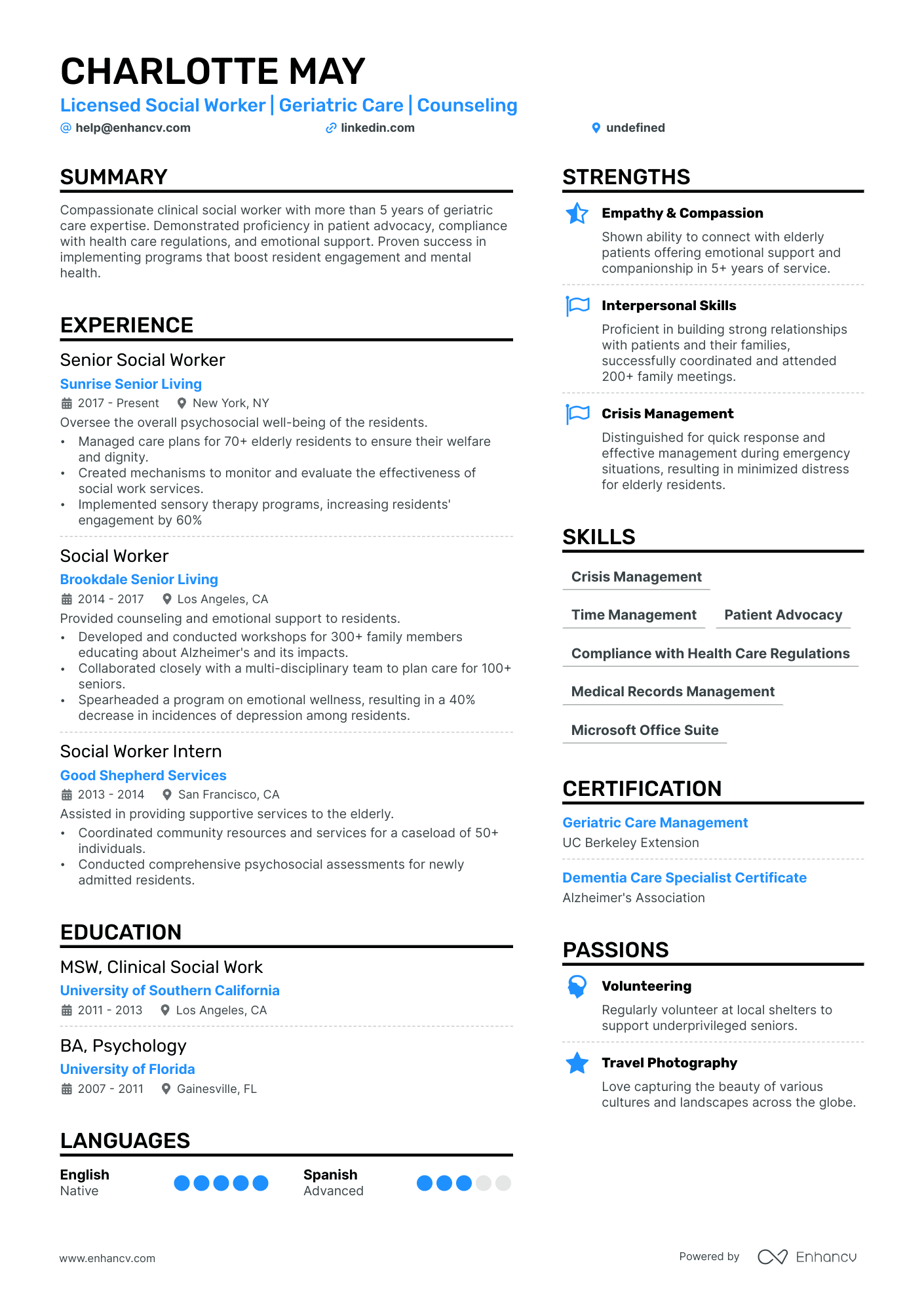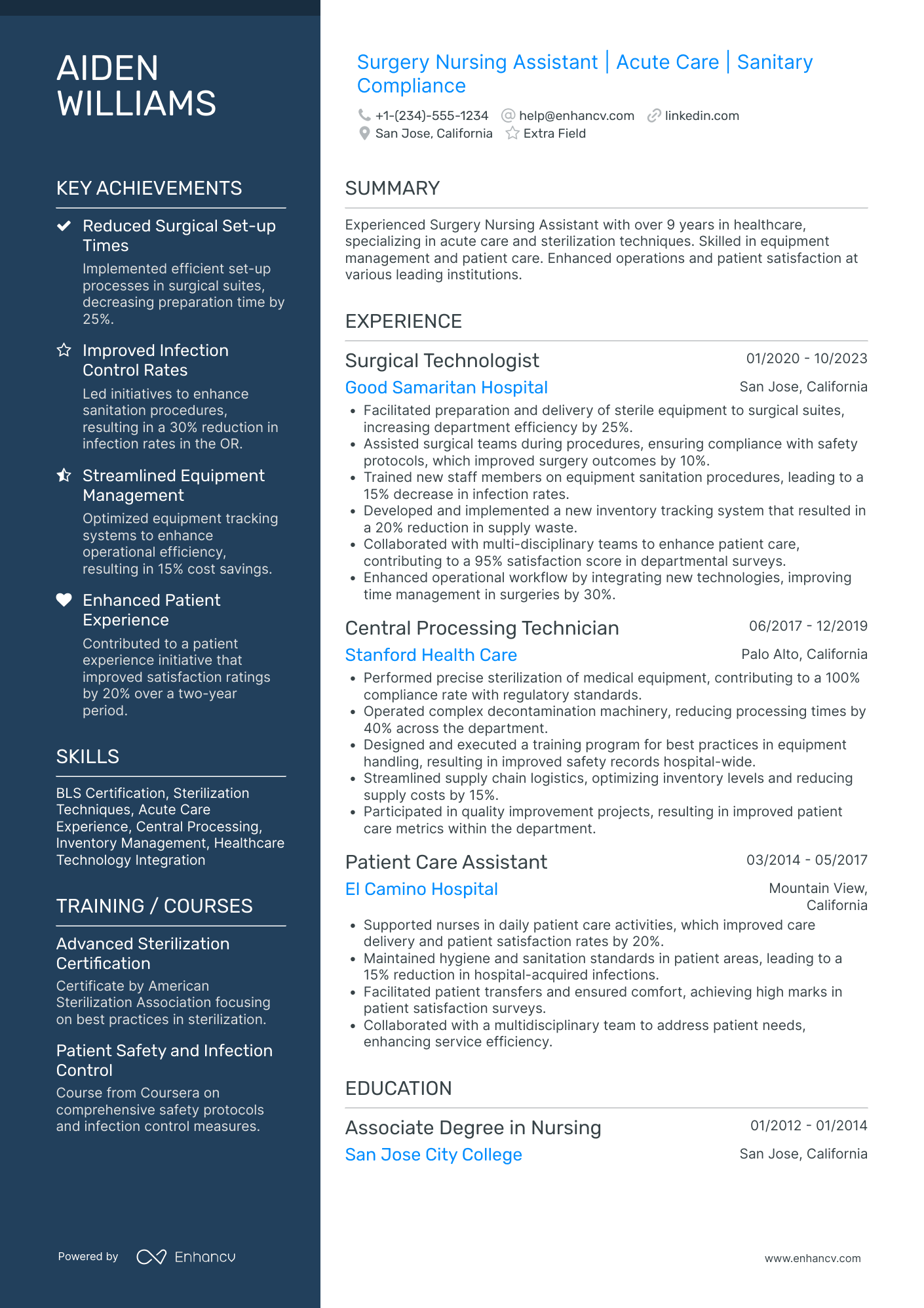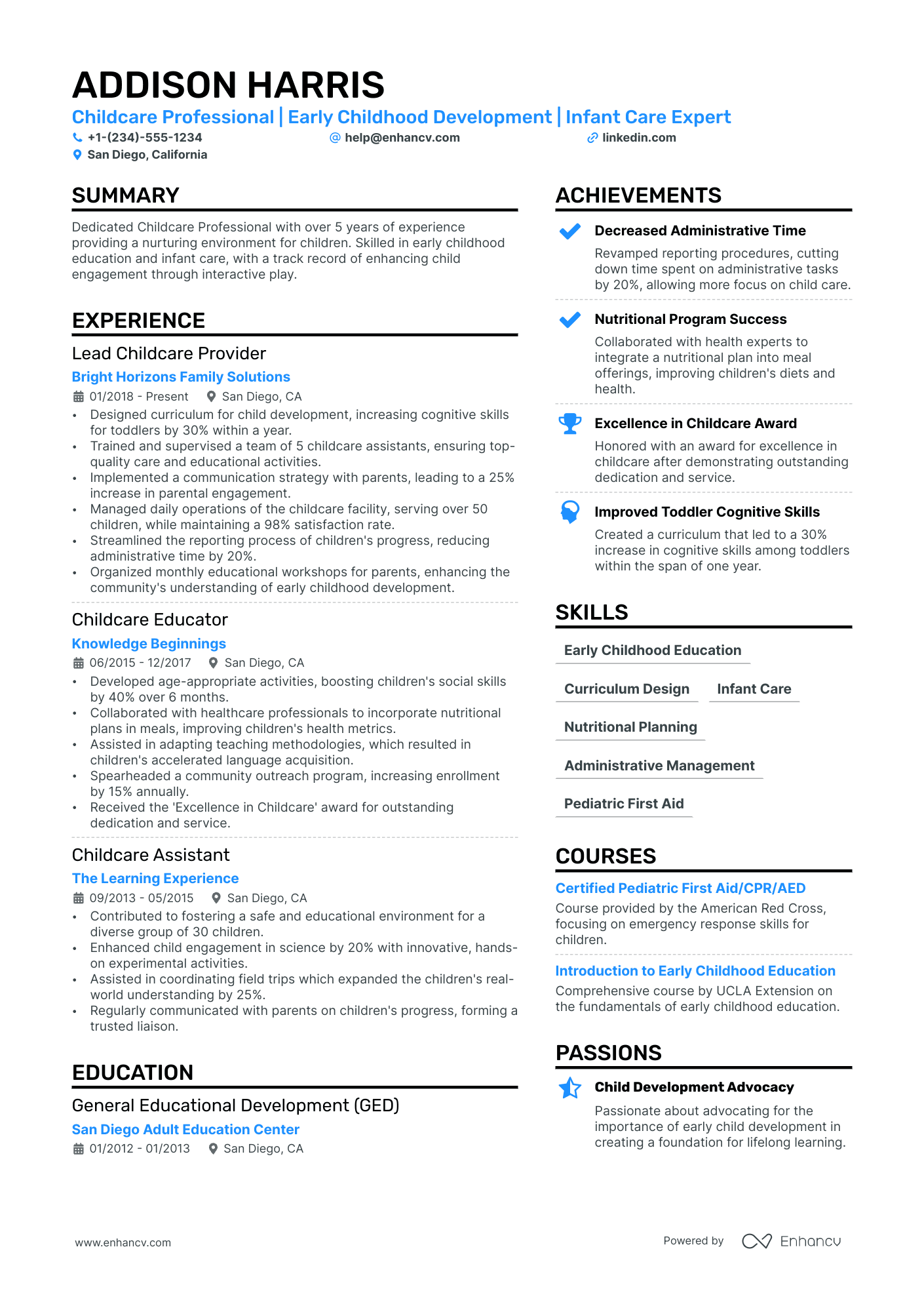Many nursing homes and facilities found themselves severely understaffed, following the release of new federal requirements. This means that numerous nursing positions will be opening in the coming months.
If you’re passionate about helping others improve their health and are proficient in operating a variety of medical equipment, this is your chance to start your career as a nursing assistant.
In this guide, we’ll go over:
- How to choose the best resume format according to your level of experience;
- What to include in your resume header to ensure recruiters understand your qualifications before they review your application;
- When and how to craft a professional objective or summary;
- How to build an impactful and ATS-compatible (Applicant Tracking System) experience section;
- How to showcase your professional qualifications and certifications;
- Real nursing assistant resume examples and the writing traps you must avoid.
Consider taking a look at other nursing-related guides we have:
How to Format a Nursing Assistant Resume
Writing a good shift report or an outstanding nursing assistant resume both hinges on having excellent communication skills and being able to relay important information succinctly.
The first step in showcasing your skills and expertise properly is choosing a suitable resume format. Working with the right framework will guarantee you’re making the most out of your resume because you’re highlighting all the relevant know-how you have to offer.
Let’s review the three most popular layouts and when to use them.
Reverse-chronological resume format
If you’re a tenured nursing assistant with plenty of experience in a variety of health environments, pick the reverse-chronological resume format. Hiring managers are keen to understand how much of your experience is relevant to the offered role to determine the range of responsibilities you can potentially take on.
It’s worth noting that because of the heavy focus on prior positions, the reverse-chronological resume format makes career gaps more visible. So, if you have any, remember to include additional information that will explain how you were engaged during that time. For example, reference other professional commitments you’ve had or supplementary nursing training you’ve undergone.
Hybrid (combination) resume format
As its name suggests, the hybrid resume format strives to provide a balanced overview of your practical experience, transferable skills, and expertise. This is what makes it the perfect layout for candidates who have less than five years of experience or are switching careers from an adjacent field. It’s also ideal for positions that require you to feature both home care and clinical experience — especially if the role requires comprehensive knowledge of specialized medical equipment for long-term care patients.
Functional resume format
Your third option is the functional resume format. The layout concentrates mainly on your relevant skills and qualifications rather than hands-on experience. For example, if you have customer support experience, you can boast about your strong communication skills and ability to empathize with others. Thus, the functional template is ideal for recent college grads and candidates aiming to secure their first clinical rotation.
Consider your target market – resumes in Canada, for example, follow different layout conventions.
Is your resume good enough?
Drop your resume here or choose a file. PDF & DOCX only. Max 2MB file size.
In addition to choosing the proper resume format, you also have to keep in mind the following formatting tips:
- Add your nursing credentials in the resume header: Very often health recruiters are seeking applicants with a particular set of qualifications. So, don’t make them scan your whole resume to figure out what you’re an expert on. Place your credentials next to your name, contact information, and address.
- Build an ATS-compatible nursing assistant resume: One way hiring managers vet potential candidates is by scanning resumes and cover letters with ATS tools. The scans take into account factors, such as design, layout, and resume keywords that reference specific skills, such as the ability to use Electronic health record (EHR) software. Make sure you use the job description wording when listing your skills.
- Opt for a readable resume font and a clean design: Select a simple font, such as Lato or Rubik, to make your resume easy to scan. Also, stick to more established designs that won’t distract recruiters from what’s really important — your professional achievements and expertise.
- Use the health organization’s branding colors in your resume: Medical facilities oftentimes use colors that both invoke trustworthiness and reflect their services. So, if you’re applying for a position at a health organization, incorporate its branding palette as the color scheme of your resume.
- Don’t make your resume longer than necessary: Consider how much of what you want to share is relevant. Be selective about the past roles you list and the achievements you highlight. Tailor your experience section according to the job description requirements.
- Save your nursing assistant resume as a PDF file: Unless the job ad states otherwise, preserve the design and formatting of your resume by saving it as a PDF file. This will ensure your application is displayed properly, regardless of what device it’s viewed on.
After you create a rough draft of your resume, split it into a few sections. Don’t forget to make room for the essential ones first. Then, if you have some extra space, include additional sections to reflect other relevant details about your career.
Below are the must-have sections for your nursing assistant resume:
The top sections on a nursing assistant resume:
- Objective statement: State what your career goals are and how they align with your potential employer. This will emphasize the value you’d bring to the healthcare organization.
- Certification and licenses: Showcase the necessary role qualifications, such as your CNA License, CPR Certification or other nursing-specific certification.
- Professional experience: It is essential to detail your experience and demonstrate your hands-on skills in patient care, including where you've worked and in what capacity.
- Skills: Be specific about your nursing competencies and present your healthcare, patient care, and other relevant skills in this section for a straightforward reference.
- Education: Although many positions require only a high school diploma or an equivalency diploma, do outline your academic background — especially if it’s nursing-related.
After you divide your resume into sections, think about the key points you must reference:
What recruiters want to see on your resume:
- Certification or licensure: Recruiters prioritize candidates with CNA licenses because it is a legal requirement for working as a nursing assistant in many regions.
- Direct patient care experience: This is valued because it speaks to the hands-on abilities of the candidate to handle patients, helping with routine activities and responding to their needs.
- Knowledge of medical terminology: Understanding medical jargon is important as nursing assistants work in healthcare settings and need this knowledge to effectively communicate with team members.
- Physical endurance and strength: This is prioritized because the role often requires long hours, moving patients, and assisting with physically demanding tasks.
- Interpersonal and communication skills: nursing assistants interact with patients, family members, and healthcare staff, so they need strong skills in these areas to perform their roles efficiently.
One wonderful thing about medicine is people are living longer, healthier lives. However, we also have to have the nurses to take care of them.
Braxton Nowell, UNC Health RN
How to Write Your Nursing Assistant Resume Experience
Generally speaking, the resume experience section is where you summarize your work history, outline your nursing responsibilities, and list your skills. But this simplified view often traps candidates into thinking all they have to do is recount their work tasks and duties. While these are a crucial part of your professional profile, health organizations are more interested in the results your expertise and skills offer.
Therefore, the best way to go about describing your nursing assistant experience is by featuring your career achievements. These will help health recruiters get a better idea of your patient care approach, as well as the scope of work you’re able to take on.
This is where the relevancy of your nursing accomplishments comes in. Hiring managers want to make sure you’re familiar with the work environment you’re potentially going to operate in. If you’re aiming for a nursing assistant role in a medical facility, but most of your experience falls under home care, you’ll have to prove your ability to adapt, multitask, and work in a stressful environment.
PRO TIP
Reference the type of patients and ailments you have experience treating. However, always keep in mind that health recruiters prioritize candidates who protect patient confidentiality. So, be careful not to include any sensitive data when describing your achievements.
So, before you start filling out your nursing assistant resume template, think about which parts of your work history best relate to the available position. Then, list each as a separate entry in your experience section.
Here are some recommendations and tips to take into account:
- Disclose the legal name of your past employer: Health recruiters often do their due diligence when vetting medical specialists because reputation is everything. They want to make sure that none of your past employers were sanctioned for medical malpractice — especially during your tenure.
- Provide your subspecialty, if applicable: If your goal is to become a member of a specific hospital unit, you must mention your subspecialty as recruiters prioritize applicants with specific in-depth medical knowledge.
- Briefly describe your past employer’s main medical focus: If you’re aiming for a position in a health organization, you must be able to work cross-functionally and provide support to a large range of medical specialists and patients. That’s why it’s recommended you list some of the main health services you have experience with.
- State the dates of your tenure: For each start or end date cite the month and the year. For example, “May, 2024”. If you’re still actively employed, write “Present” as your end date.
- Align your nursing assistant experience with your potential employer: Many health organizations strive to offer a certain standard of medical care or commit to tackling specific health issues. That’s why recruiters seek candidates who are passionate about working towards the same goal. Emphasize how your nursing assistant experience fits with the community of medical specialists the health organization fosters.
- Don’t forget to highlight your career growth: Instead of recounting day-to-day duties to demonstrate the scope of your nursing abilities, describe the results of your work by listing at least one or two achievements for each experience section entry. To underscore the significance of your accomplishments, begin each bullet point with an action verb.
- Build a targeted resume: One of the key characteristics of an impactful resume is how much thought was put into tailoring it to a specific role. This means that the candidate has referenced most of the required skills and expertise from the job ad. The best way to do this is to mark resume keywords from the job description, such as names of tools and medical equipment, and incorporate them in your experience entries.
Now, take a look at the following bad example:
- •Improved the health rate of over 380 patients.
- •Increased patient satisfaction rates.
- •Helped 1150+ patients regain mobility by providing post-operative care and physical therapy assistance.
While the applicant did well with describing their past employer, many details about their tenure and achievements are missing from the rest of the entry.
The candidate has listed the number of patients they have treated, but they haven’t described the type of patients or illnesses they have expertise in. And despite citing some data, crucial numbers like the patient satisfaction rate are missing. Finally, none of the entries point to whether the candidate is adept at operating medical equipment.
An enhanced version of the example above would be:
- •Improved the health rate of over 380 patients by 75% after establishing care plans for stroke patients with limited or impaired mobility.
- •Increased patient satisfaction rates by 52% by mentoring new nurses on how to effectively communicate with patients and their families.
- •Helped 1150+ patients regain mobility by providing post-operative care and physical therapy assistance, using equipment such as the RT300, the Bioness Integrated Therapy System, and the Vector Gait & Safety System.
The main reason why this edit works is because the candidate has:
- Included all the missing details, such as the type of patients they specialize treating;
- Pointed to specific measurable outcomes that demonstrate their nursing assistant work performance;
- Listed some of the medical equipment they have experience operating.
How to quantify impact on your resume
Hiring managers value candidates who have a goal-oriented mindset and a keen attention to detail. That’s because work performance and results are directly linked to patients’ overall health.
As such, medical organizations and private employers want to make sure the nursing assistants they hire will prioritize patients’ health over other job performance indicators. By quantifying your achievements and sharing measurable results, you can prove your ability to communicate effectively with patients, think critically, and provide emotional support when needed.
The numbers you share will depend on your level of expertise and years of experience. Below are some ideas to get you started:
- Include the number of patients you cared for regularly: This demonstrates your ability to handle workload, manage time effectively, and maintain quality of care.
- Specify the number of shifts you took per week: Frequently taking on extra shifts shows your dedication and commitment to the job.
- Detail how many different types of medical equipment you're proficient with: It indicates your versatility and ability to adapt to different care situations.
- Indicate the percentage of patient satisfaction or feedback received: It provides a tangible measure of the quality of care you provide.
- Mention if you trained or mentored any new nursing assistants and how many: This showcases your leadership and coaching abilities.
- Provide the number of emergency situations you've handled: It demonstrates your ability to stay calm and effective under pressure.
- State the number of languages you speak fluently: This shows cultural competency, which can improve patient communication and satisfaction.
- List how many care plans you contributed to or implemented: This shows your knowledge and abilities in planning and ensuring comprehensive patient care.
How do I write a nursing assistant resume with no experience
Crafting a nursing assistant resume with no experience can be tricky — particularly if you have to discuss how you handle patient care or your ability to operate certain medical equipment. Odds are, the bulk of your practical experience is shadowing other nurses.
But here’s the catch, this is something you can reference on your resume. Albeit it isn’t exactly hands-on experience, recruiters will recognize your motivation to immerse yourself in an actual work setting to improve your skills. This also proves your commitment to the nursing profession.
In addition, research the health organization offering the position. As mentioned, most medical facilities face bigger challenges than day-to-day operations and tasks. Find out what the organization’s main medical services are, as well as the type of patients it most frequently treats. Also, determine how you can align your professional profile to reflect the requested expertise.
Once you understand what your potential employer is working towards and which skills are prioritized, tie them to your:
- Clinical rotations: Highlight your familiarity with all the standards and protocols you must adhere to when in a medical working environment. Accentuate your ability to take guidance from other medical specialists, implement treatment, and actively listen to your patients.
- Certifications and supplementary training: Emphasize your broad range of expertise and your continuous strive to develop as a nursing assistant. If any of your training has earned you specific qualifications, list them next to your name in the resume header.
- Transferable skills: Your social skills are as equally vital to conduct your job effectively as your medical competencies. Recruiters prefer candidates who can empathize with patients and treat them with the respect they deserve.
Next, we’ll delve further into how to talk about your abilities and core nursing skills.
How to List Your Hard Skills and Soft Skills on Your Resume
Given the complexity of the job, you’ll have to showcase different aspects of your character and abilities in the skills section of your nursing assistant resume.
A common writing mistake here is to outline your full skill set. The result is an overcrowded resume. The trick to avoid this pitfall is targeting specific job ad requirements.
But first, let’s review how your nursing skills are typically categorized and how you can build a balanced skills section.
Hard vs soft skills
Simply put, your professional competencies can be separated into two types:
- Nursing assistant hard skills: Also known as your technical skills, these reflect your knowledge of medical terminology, ability to use measuring equipment and provide postoperative patient care.
- Nursing assistant soft skills: These illustrate your level of emotional intelligence and include skills, such as time management, multitasking, and showing compassion towards your patients and their family members.
As you can imagine, if you recount all of your abilities, you can build a very comprehensive and unnecessarily long skills section. But there is no need to do this to impress recruiters. All you have to do is create a well-rounded profile of your skill set.
To do this:
- Re-read your resume once again — specifically your experience and education sections.
- Verify if you’ve already mentioned any of the skills from the job ad.
- Make note of the ones you haven’t addressed yet and include them in your skills section. Don’t add more than 10 skills to avoid overcrowding your resume.
- Describe how you acquired your skills by referencing career achievements and certificates you’ve obtained.
If the job description doesn’t provide a full list of the necessary skills required for the role, you’ll have to go back to your research about the health facility. If the ad mentions the type of medical services the organization offers or the nursing assistant subspecialty requested, align your skills section with this information.
We’ve also compiled two lists with the currently most popular social and technical skills for nursing assistants to help you out. Is there any missing from your resume? Showcase them in your skills section!
Best hard skills for your nursing assistant resume
- Basic nursing skills
- Patient transfers
- Wound dressing
- Infection control
- Vital signs measurement
- Catheter care
- Electronic health record (EHR) software
- Microsoft Office
- Patient bathing
- Medical equipment operation
- CPR
- Medical terminology
- Feeding assistance
- Tracheostomy care
- Medication administration
- Blood glucose monitoring
- Therapeutic techniques
- Physical therapy assistance
- Post-operative care
- Bedpan changes
Best soft skills for your nursing assistant resume
- Compassion
- Patience
- Empathy
- Effective communication
- Time management
- Multitasking
- Critical thinking
- Attention to detail
- Problem-solving
- Service orientation
- Adaptability
- Stamina
- Interpersonal skills
- Emotional resilience
- Tact and diplomacy
- Active listening
- Professionalism
- Decision-making skills
- Teamwork
- Respect for patient confidentiality
How to List Your Certifications and Education on Your Resume
As mentioned in the beginning, health recruiters are very particular about the set of nursing assistant qualifications they demand from candidates. That’s why crafting an outstanding education section properly is just as important as your work history.
Formal education
The level of detail you add to your education section is based on the amount of practical experience you have. If you’re a recent graduate, include the:
- Name of your degree, as well as the qualifications you’ve obtained.
- Provide the name of the academic institution and its location.
- Cite the start and end date of your course. If you’re still undergoing training, state the expected date of graduation.
- Describe one of your top academic achievements, such as a relevant piece of coursework you’ve done.
- Reference majors and minors that directly relate to the required subspecialty.
Here is what an ideal education section looks like:
- •Researched and presented a presentation on the Common Misconceptions in Nursing on Commonly-administered Drugs in the Journal of Clinical Nursing.
- •Majored in Medical Surgical Nursing, Principles of Human Anatomy and Physiology, and Pharmacology.
On the other hand, if you have more than four years of clinical experience, you can omit details about your academic focus and work. Instead, concentrate on additional training you’ve undergone after graduation.
You can do this by recounting your qualifications and certifications. Here is how to do it.
Certificates
Listing certifications on your resume is easy! All you have to do is:
- Select the credentials that relate most to the offered position.
- Check their date of validity, as well as their status. Health recruiters must ensure that you’re eligible to practice within the jurisdiction cited in the ad. More importantly your credentials have to be in good standing with the relevant Board of Health.
- Organize them in order of relevancy, starting with the most pertinent certificate.
- State the qualifications you’re granted upon completion of the training.
- Provide the name of the issuing institution and the date you received the certificate.
Like so:
Best certifications for your nursing assistant resume
How to Write Your Nursing Assistant Resume Summary Or Objective
Finally, don’t neglect to declare what motivates you to pursue the available role by writing a powerful resume profile. This is a short paragraph of no more than 100 words at the top of your resume that provides an overview of your accomplishments and top skills.
Depending on the years of clinical experience you have, there are two types of resume profiles you can build.
If you’re a tenured nursing assistant with more than five years of experience, then opt for a resume summary. This profile type focuses on your:
- Career achievements: Highlight at least one accomplishment that showcases your value as a nursing assistant.
- Subspecialty and specific training: Cite two or three of your key technical nursing skills to emphasize how your professional profile relates to the available position.
- Type of patients you have experience treating: By describing your experience in patient care, you’ll provide evidence of how you acquired your top nursing skills.
By contrast, if you’re a nursing assistant novice, write a resume objective. Although its structure is similar to the summary, this profile concentrates on your:
- Potential value as a nursing assistant: Since you haven’t established yourself as a medical specialist yet, you’ll have to advocate for yourself and all the benefits your work will bring.
- Clinical rotations you’ve completed: Hiring managers prioritize candidates with clinical and shadowing experience as familiarity with the medical equipment and work environment are crucial for the position.
- Academic background: To make your professional profile more well-rounded, mention the type of qualifications you have. These will prove that your abilities are up to the latest nursing standards.
Let’s illustrate the differences with a few examples.
First, have a look at the sample below:
Even though the candidate has appealed to the health organization by referring to the exact position they’re aiming for, this nursing assistant resume objective won’t impress recruiters.
Most of the issues concern the lack of explanation surrounding the applicant’s achievements and skills. The paragraph doesn’t mention how the accomplishments came to be or how the candidate acquired their skills.
Last, but not least, the applicant should’ve refrained from using field-specific abbreviations as not all hiring managers recognize them. So, to avoid ambiguity, write out the full name of your degree and qualifications.
Here is how to amend the paragraph:
This version is better because it describes the type of clinical experience the candidate has, as well as what their work entailed during their residency. Plus, the objective relates the applicant’s technical talents with their clinical experience.
Now, take a look at the following example:
The above nursing assistant resume summary won’t catch the recruiters’ eye because it doesn’t properly describe the applicant’s subspecialty and qualifications. Hence, the profile doesn’t offer any reasonable support in favor of the candidate’s application for a position in the facility’s maternity ward.
Plus, the applicant has missed the chance to match possible resume keywords by writing out the full name of their certificate.
An improved version of the summary would be:
This profile provides strong arguments as to what makes the candidate qualified to be a member of the health organization’s maternity ward as they list:
- Pertinent achievements;
- Relevant hard and soft skills;
- Supplementary subspecialty training.
Optimize your resume summary and objective for ATS
Drop your resume here or choose a file.
PDF & DOCX only. Max 2MB file size.
Additional Sections for a Nursing Assistant Resume
We know that every job seeker is different, so in most cases, a cookie-cutter resume template won’t do. If you still want to share role-relevant information that doesn’t fit into any of the essential sections we’ve discussed so far, you can build your own.
To do this, first determine what type of experience or ability you want to add to your resume. Then, think about how to best categorize your expertise.
Here are some ideas on what else you can add:
- Volunteering experience: Relevant clinical experience doesn’t have to come from residencies and rotations alone. Volunteering at a health-related event, such as a blood donation drive, will demonstrate your commitment to the job and willingness to improve your skills in patient care.
- Publications and research: If you’ve delved primarily into the academic side of nursing, describe your particular medical focus. This will inform hiring managers of what motivates you to pursue nursing and how you plan to grow further as a medical specialist.
- Non-medical training and courses: Depending on the type of patients you’ll be treating some of your non-nursing education can be of value to your potential employer. For example, imagine you’re aiming to become a nursing assistant at a children’s summer camp. If you’ve undergone specialized search and rescue medical training, you’ll be among the top contenders for the position!
- Language skills: Patients come from all walks of life. That’s why recruiters prefer candidates who are proficient in foreign languages or American Sign Language (ASL) as they are well-equipped to understand their patients’ needs better and provide the necessary care.
Key Takeaways
In conclusion, to write an impressive nursing assistant resume, you’ll have to do a bit of research about the health organization to tailor your application accordingly. Once you do that, simply:
- Choose a resume format that will best represent your experience and expertise.
- List your nursing assistant qualifications next to your name in the resume header.
- Craft a resume summary or objective to explain how your skills relate to the offered role.
- Describe the range of medical services your past employers provide when recounting prior roles.
- Explain what experience you’ve gained during your tenure and what your approach to patient care is.
- Remember to always quantify your achievements to showcase the impact of your work.
- Don’t add more than 10 skills in your talent section to avoid overcrowding your resume.
- Arrange your degrees and certificates in order of relevancy.
Nursing Assistant resume examples
By Experience
By Role
